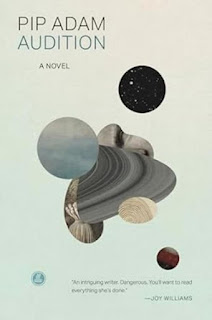He knows there is something else under all this. He knows there exists an under-England, a chthonic place of hidden rivers and buried relics, of the bones of extinct animals and battle-slain bodies. Layer upon layer of it, laminations of land, each made from stories packed tightly by the weight of time so that they become something else, just as wood becomes charcoal. So many stories, so many unseen footsteps. So many secrets that go beyond the limitations of the here and now.
Kate Sherrod blogs in prose! Absolutely partial opinions on films, books, television, comics and games that catch my attention. May be timely and current, may not. Ware spoilers.
Monday, July 7, 2025
Benjamin Myers' THE PERFECT GOLDEN CIRCLE
Saturday, July 5, 2025
Pip Adam's AUDITION
I am thinking very hard for a moment but trying not to go quiet like we did the last time we tried to think very hard.
They were the unwanted. That was clear to them, perhaps it had been from the start. They took up too much room.
We thought if we broke the ship, we'd remember,' Drew says. 'That we'd get it back. Ourselves before the classrooms.' The ship settles again, suddenly, and the sound levels out. 'And we were wrong,' Alba says.
Stanley and Drew are beside her and they’re under the tree where they spent the first night. It is changed. Some kind of autumn has come over it. Its branches reach the ground now and it’s a different colour. The sky around it has also turned. Everything is shifting from the pastels into much more saturated colours. The brightening has been happening, Alba now realises, gradually the whole time they’ve been there. But now it’s at a point where it affects everything. The whole world sings in the bath of the colour field that comes from the sky but the tree has definitely changed colour, it isn’t an effect of the sky. The three newcomers who aren’t that new anymore shade their eyes from the brightness but T.J., A.J. and R.J. look at them with open eyes, waiting for them to sit down. The locals are stiffer in their movements and possibly taller. They sit in a more anchored way than the first day they sat together. They are taking up a different space. Alba looks at Stanley and then at Drew and none of them have changed in the same way. No physical change has come over them at all. They are the same as when they first arrived. Which surprises her because her insides feel completely rearranged.
I can't say much more about this aspect of the novel without giving too much away, so I'll just take a moment to marvel at how it transforms the entire rest of the story, including some pretty distressing material that comes up once our trio manages to break their conditioning and remember how they knew each other before the Classroom, before they even became Giants. Audition isn't here to coddle us and our delicate little feelings (though it's not here to brutalize us, either), you guys.
What it is here for, is to ask us to ask ourselves how certain we are that the world has to be the way it is now, that people have to have the relationships that they have, that what we know now about the universe is all that we can know, and that we are right about what we think we do know. That's all a pretty big job for a novelist, but judging from this book, my first read from both author Pip Adams (and from her fascinatingly off-beat U.S. publisher, Coffee House Press, which, more from them very soon!), Pip Adam is up for the job.
I think I'm going to need to read this one again sometime soon.
Wednesday, July 2, 2025
Andy Sharp's THE ENGLISH HERETIC COLLECTION: RITUAL HISTORIES, MAGICKAL GEOGRAPHY
Can we use film geographies to create cultural maps across a slice of time?
The tourist party had come to Hathersage to view Little John's grave which takes up seven feet of the burial ground. Little John is the church's most famous inhabitant. I'd like to imagine Little John's reanimated corpse joining forces with Guthrie**** and his undead merry men to reap anthropophagic revenge on the do-gooding snitchers of Hathersage.
Tuesday, July 1, 2025
Zülfü Livaneli's ON THE BACK OF THE TIGER (Tr Brenden Freely)
He was now certain that he and the former Sultan had reached a new agreement. It was as if he was the judge and the sultan was the defendant. One was interrogating, and the other was being interrogated. The doctor laughed aloud at the sense of power he felt, then began coughing from the cigarette smoke he just inhaled. After he got his coughing under control, he thought to himself, Having power is a wonderful thing.






